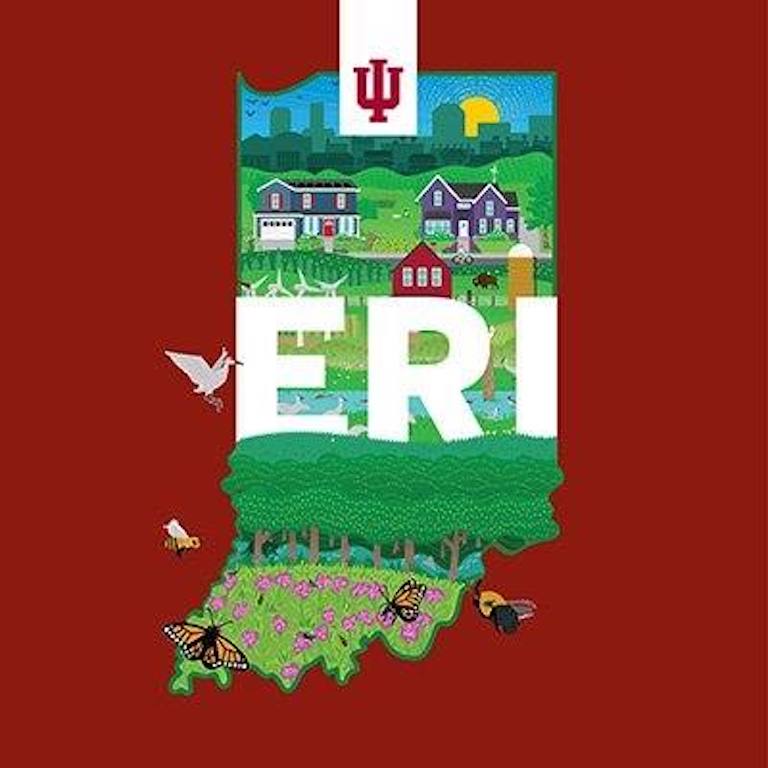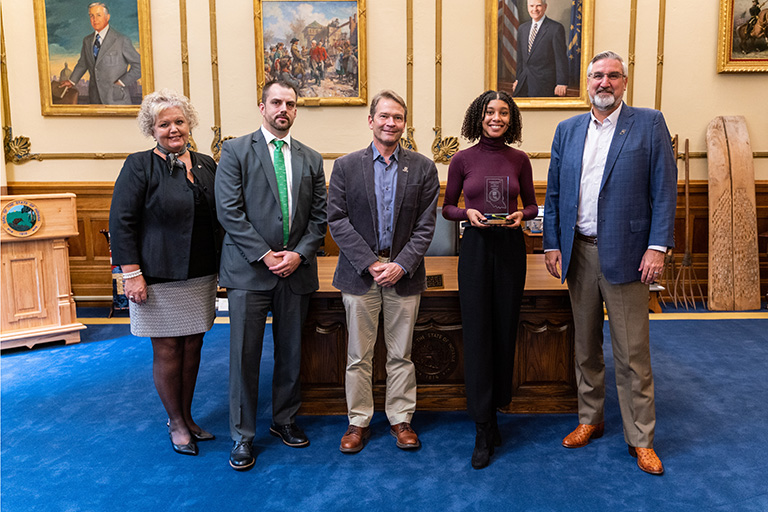As Hoosiers reflect on 2021, the Environmental Resilience Institute (ERI) is celebrating a year of transition, progress, and growth in building a more resilient future for Indiana.
In April, ERI welcomed IU faculty Gabe Filippelli and Sarah Mincey as co-directors of the institute. The duo replaced outgoing director Janet McCabe, who was appointed the deputy administrator of the US Environmental Protection Agency.
Under new leadership, ERI continued to advance its mission to help Indiana and the Midwest address environmental change. For the third straight year, the institute partnered with local governments to work toward climate goals. Thirty-one Indiana communities worked with ERI to create greenhouse gas inventories that measure local contributions to global warming. Another nine communities partnered with ERI to lower barriers to solar development, plan for a transition to electric vehicles, and treat wastewater more efficiently. Additionally, two Indiana communities joined ERI’s pilot program to study the effects of extreme heat on Hoosiers, conducting the state’s first heat watch campaigns in August.
Because of this work and other ERI initiatives, the institute was honored with Indiana’s top environmental award in September. To date, Hoosier communities representing 44 percent of the state's population have completed greenhouse gas inventories through ERI’s Resilience Cohort program. Collectively, these communities have identified the equivalent of 34 million metric tons of carbon dioxide for elimination. That's about the same as removing 7.4 million cars from U.S. roadways for one year.
Leveraging Research to Build Resilience
Beyond working with Indiana communities, the research of ERI affiliates made headlines and pointed toward practical strategies and solutions to galvanize public support and make positive strides toward a climate resilient future.
In April, ERI affiliates launched the Indiana Green City Mapper, a statewide spatial inventory, charting six forms of green infrastructure—urban forests, green roofs, parks, greenways and trails, urban food gardens, and green stormwater infrastructure—in the state. By pairing this data with social vulnerability and climate change information, the mapper is empowering local leaders to make informed decisions about resilience planning.
In June, ERI released the results of the Hoosier Life Survey 2.0 a statewide survey that captures Hoosiers’ perspectives on environmental challenges and seeks insight into how Indiana residents coped with health, economic, and justice-related crises of 2020.
The results show that Hoosiers are more concerned about a future disease outbreak than they were before 2020, with nearly 1 in 2 Indiana residents anticipating that their family is likely to be affected by a new disease outbreak in the next decade. Furthermore, the survey captures slight increases in concern about climate change compared to the initial Hoosier Life Survey issued in 2019, a surprise given the more immediate crises of 2020.
To spread ERI’s research and implementation expertise with other parts of the Midwest, the institute joined the Midwest Climate Adaptation Science Center (CASC), a U.S. Geological Survey-funded consortium of eight universities and natural resource organizations. Together, the Midwest CASC will work closely with federal, state and tribal entities in Minnesota, Wisconsin, Michigan, Iowa, Missouri, Illinois, Indiana, and Ohio to support management and protection of land, water, and natural resources with actionable climate science, innovation, and decision support tools.
In December, ERI announced an expansion in programming that will guide the institute’s efforts in 2022 and beyond. Through a $1.25 million grant from the McKinney Family Foundation, ERI will be leading the McKinney Midwest Climate Project. The project combines the institute’s existing climate action programs with Sustain IU’s Indiana Climate Fellows to accelerate Indiana’s progress toward carbon neutrality and to connect students to valuable career training in sustainability and the environment.
Under the McKinney Midwest Climate Project, ERI will broaden its climate mitigation and resilience programming to include business and nonprofit partners while continuing to support local governments. The institute will also administer and support the placement of undergraduate and graduate students who will work with organizations across the state on sustainability initiatives.
If 2021 is any indication, ERI will continue to play an important role in Indiana’s resilient future for years to come.






